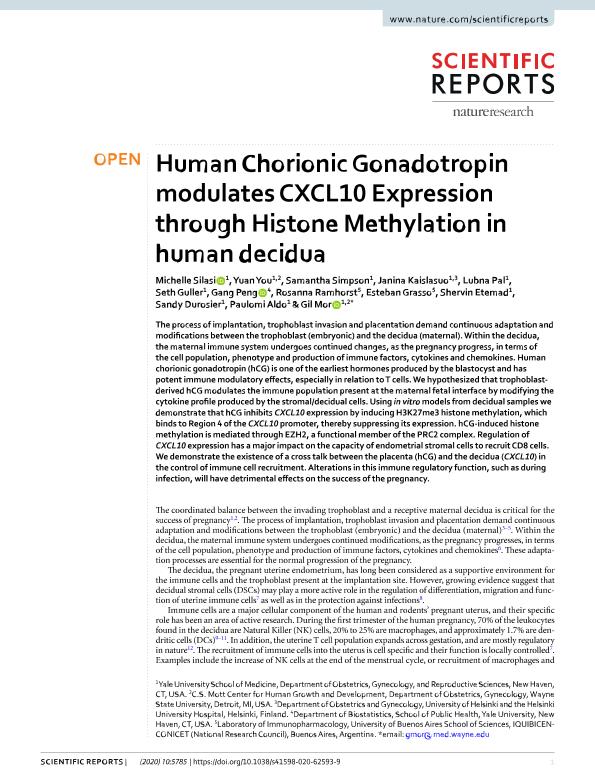Artículo
Human Chorionic Gonadotropin modulates CXCL10 Expression through Histone Methylation in human decidua
Silasi, Michelle; You, Yuan; Simpson, Samantha; Kaislasuo, Janina; Pal, Lubna; Guller, Seth; Peng, Gang; Ramhorst, Rosanna Elizabeth ; Grasso, Esteban Nicolas
; Grasso, Esteban Nicolas ; Etemad, Shervin; Durosier, Sandy; Aldo, Paulomi; Mor, Gil
; Etemad, Shervin; Durosier, Sandy; Aldo, Paulomi; Mor, Gil
 ; Grasso, Esteban Nicolas
; Grasso, Esteban Nicolas ; Etemad, Shervin; Durosier, Sandy; Aldo, Paulomi; Mor, Gil
; Etemad, Shervin; Durosier, Sandy; Aldo, Paulomi; Mor, Gil
Fecha de publicación:
01/04/2020
Editorial:
Nature Publishing Group
Revista:
Scientific Reports
e-ISSN:
2045-2322
Idioma:
Inglés
Tipo de recurso:
Artículo publicado
Clasificación temática:
Resumen
The process of implantation, trophoblast invasion and placentation demand continuous adaptation and modifications between the trophoblast (embryonic) and the decidua (maternal). Within the decidua, the maternal immune system undergoes continued changes, as the pregnancy progress, in terms of the cell population, phenotype and production of immune factors, cytokines and chemokines. Human chorionic gonadotropin (hCG) is one of the earliest hormones produced by the blastocyst and has potent immune modulatory effects, especially in relation to T cells. We hypothesized that trophoblast-derived hCG modulates the immune population present at the maternal fetal interface by modifying the cytokine profile produced by the stromal/decidual cells. Using in vitro models from decidual samples we demonstrate that hCG inhibits CXCL10 expression by inducing H3K27me3 histone methylation, which binds to Region 4 of the CXCL10 promoter, thereby suppressing its expression. hCG-induced histone methylation is mediated through EZH2, a functional member of the PRC2 complex. Regulation of CXCL10 expression has a major impact on the capacity of endometrial stromal cells to recruit CD8 cells. We demonstrate the existence of a cross talk between the placenta (hCG) and the decidua (CXCL10) in the control of immune cell recruitment. Alterations in this immune regulatory function, such as during infection, will have detrimental effects on the success of the pregnancy.
Palabras clave:
receptividad endometrial
,
decidualization
,
chemokines
Archivos asociados
Licencia
Identificadores
Colecciones
Articulos(IQUIBICEN)
Articulos de INSTITUTO DE QUIMICA BIOLOGICA DE LA FACULTAD DE CS. EXACTAS Y NATURALES
Articulos de INSTITUTO DE QUIMICA BIOLOGICA DE LA FACULTAD DE CS. EXACTAS Y NATURALES
Citación
Silasi, Michelle; You, Yuan; Simpson, Samantha; Kaislasuo, Janina; Pal, Lubna; et al.; Human Chorionic Gonadotropin modulates CXCL10 Expression through Histone Methylation in human decidua; Nature Publishing Group; Scientific Reports; 10; 5785; 1-4-2020; 1-17
Compartir
Altmétricas



